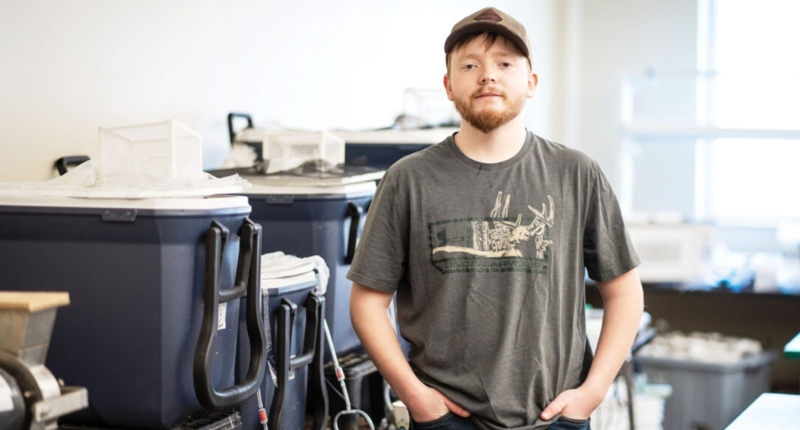Jared Bishop, a senior Honors Program student at Glenville State University, is conducting the school’s first-ever vertebrate experiment. His project focuses on the “Assessment of Biological and Chemical Contamination in southern West Virginia’s Cold-Water Fisheries,” which is divided into two phases. The first phase concluded in early March, and Bishop utilized 600 rainbow trout eggs to monitor egg mortality and development until all surviving specimens had reached the fry stage. The second phase is currently underway, using 120 rainbow trout fingerlings to monitor survivorship and growth rates. Bishop received funding from EnerGIS to conduct the study and plans to present his experimental results at Glenville State’s Pioneer Showcase.
Senior Honors Program Student Conducts Glenville State University’s First Vertebrate Experiment
Jared Bishop, a senior Honors Program student at Glenville State University, is conducting the school’s first-ever vertebrate experiment. Bishop’s research focuses on the “Assessment of Biological and Chemical Contamination in southern West Virginia’s Cold-Water Fisheries,” which is also the topic of his thesis.
Bishop’s experiment is divided into two phases, both of which examine the effects of industrial waste and infrastructural concerns on Elkhorn Creek in McDowell County and the Upper Guyandotte drainages in Raleigh and Wyoming Counties. The study also includes unaffected streams within Camp Creek State Forest in Mercer County as a basis for comparison.
The project began in October 2021, with Bishop collecting water samples from five sites in each study area watershed. He received funding from EnerGIS to conduct the study. “Using the water quality data obtained through the preliminary study, it was determined that water quality was variable per drainage and each system could be regarded as a treatment group for experimentation,” Bishop said.
In January, he revisited water sample locations to collect soil samples, five gallons of which were taken from each drainage. The soil samples were brought back to Glenville State’s Environmental Science laboratory to serve as a streambed substrate and contaminant source for each experimental treatment group.
Each drainage’s soil samples were combined with 25 gallons of dechlorinated water and placed into a storage container. Each container was insulated with polystyrene and plumbed into an aquarium chiller to maintain a constant water temperature of 50 degrees. The water from the reservoir was pushed into the first of two coolers, which act as enclosures for specimens and provide two replicates of each treatment. Once water levels in the first tank reached the overflow pipe, water flowed into the second tank placed at a slightly lower elevation than the first. In a similar fashion, once the water level in the second tank reached the outlet pipe, it returned to the reservoir.
Through the continuous cycling of water, the enclosure systems, and soil samples placed in the reservoir, Bishop’s experiment simulates the hydrology of a stream and serves as a realistic model of southern West Virginia’s trout streams.
Overall, Bishop’s study aims to assess the impact of industrial waste and infrastructural concerns on the water quality of southern West Virginia’s cold-water fisheries.
Glenville State University’s First Vertebrate Experiment Continues
Jared Bishop, a senior Honors Program student at Glenville State University, is conducting the school’s first-ever vertebrate experiment. His project, which focuses on the “Assessment of Biological and Chemical Contamination in southern West Virginia’s Cold-Water Fisheries,” is divided into two phases.
The first phase of the experiment was concluded in early March, and Bishop utilized 600 rainbow trout eggs donated by the USDA’s Cool and Cold Water Aquaculture Research Center. He monitored the egg mortality and development until all surviving specimens had reached the fry stage, generally when fish can actively feed themselves in a limited manner.
The second phase is currently underway, using 120 rainbow trout fingerlings donated by the West Virginia Department of Natural Resources. Bishop will monitor survivorship and growth rates for a month to determine the effects of water chemistry on juvenile trout.
Bishop’s experiment, believed to be the first live vertebrate experiment by a Natural Resource Management student, was approved by the college’s Institutional Animal Care and Use Committee. He received funding from EnerGIS to conduct the study.
After experimentation concludes, Bishop plans to present his experimental results and associated statistics at Glenville State’s Pioneer Showcase.
Don’t miss interesting posts on Famousbio
